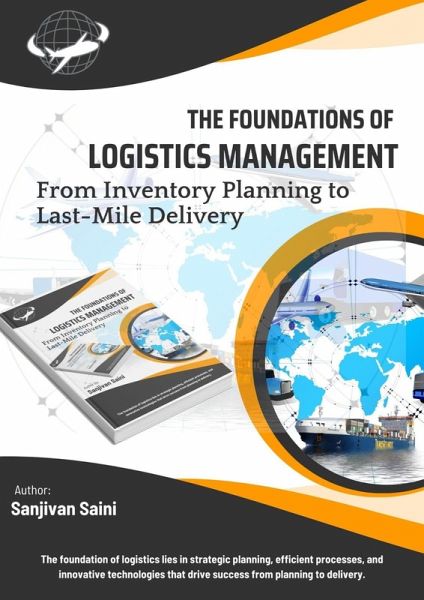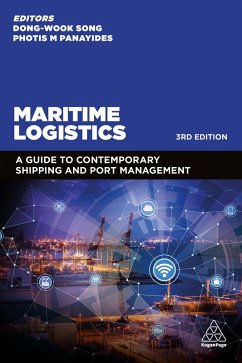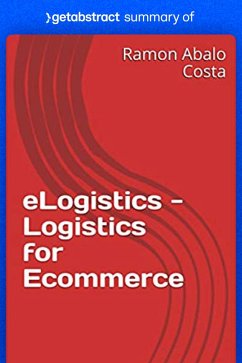
The Foundations of Logistics Management: From Inventory Planning to Last-Mile Delivery (eBook, ePUB)

PAYBACK Punkte
0 °P sammeln!
The foundation of Logistics Management: From Inventory Planning to Last-Mile Delivery" is an essential resource designed for logistics professionals, supply chain managers, and students who seek a comprehensive understanding of logistics management. This book offers an in-depth exploration of logistics fundamentals, covering everything from efficient inventory planning to the complexities of last-mile delivery, ensuring readers gain a well-rounded perspective on building and managing effective logistics systems.The journey begins with a thorough introduction to logistics management principles,...
The foundation of Logistics Management: From Inventory Planning to Last-Mile Delivery" is an essential resource designed for logistics professionals, supply chain managers, and students who seek a comprehensive understanding of logistics management. This book offers an in-depth exploration of logistics fundamentals, covering everything from efficient inventory planning to the complexities of last-mile delivery, ensuring readers gain a well-rounded perspective on building and managing effective logistics systems.
The journey begins with a thorough introduction to logistics management principles, highlighting their crucial role in improving supply chain efficiency and enhancing customer satisfaction. It delves into inventory planning methods, focusing on strategies to optimize stock levels, minimize costs, and maintain a steady flow of goods. The book also provides insights into material handling, packaging, and warehousing-core elements essential for establishing an efficient logistics network.
Understanding that transportation is the backbone of logistics, the book dedicates significant attention to transportation management. It outlines different modes of transport and offers practical tools for selecting the most effective methods. Additionally, it explores the concept of containerization in global logistics, demonstrating how standardized containers facilitate international trade and improve operational efficiency.
The book further explores critical elements of transportation planning and management, emphasizing the importance of route optimization, freight management, and technology in boosting logistics performance. It then turns to last-mile delivery, one of the most challenging aspects of the logistics industry today, presenting innovative solutions, technologies, and best practices for overcoming these hurdles.
Packed with real-world examples, case studies, and technical insights, "The Foundations of Logistics Management" provides a modern, practical approach to logistics. It ensures readers develop the skills and knowledge necessary to design and implement efficient, effective, and sustainable logistics systems. Whether for beginners or seasoned professionals, this guide is an indispensable tool for mastering logistics management.
Structured by Units for In-Depth Learning
Unit I: Introduction to Logistics Management This unit lays the groundwork by defining logistics management and exploring its scope, objectives, and functions. It discusses how logistics integrates into the broader supply chain and its role in competitive business strategies. The unit also explores the importance of technology, including ERP systems like SAP and Oracle, in streamlining logistics processes.
Unit II: Inventory Planning and Warehousing The second unit delves into the critical aspect of inventory planning, focusing on understanding inventory costs, classification, and methods for optimizing stock levels. It also covers warehousing, emphasizing its importance and the different types of warehouses available. Readers will learn about warehouse functions and the principles of efficient layout and design, connecting the dots between inventory management, material handling, and warehousing to create a seamless logistics operation.
Unit III: Transportation in Logistics This unit covers the fundamental role transportation plays in logistics. It examines various modes of transportation-rail, road, water, air, and pipelines-highlighting their characteristics, benefits, and economic considerations. The unit also discusses intermodal operations, showcasing how these systems optimize logistics and enhance supply chain efficiency.
The journey begins with a thorough introduction to logistics management principles, highlighting their crucial role in improving supply chain efficiency and enhancing customer satisfaction. It delves into inventory planning methods, focusing on strategies to optimize stock levels, minimize costs, and maintain a steady flow of goods. The book also provides insights into material handling, packaging, and warehousing-core elements essential for establishing an efficient logistics network.
Understanding that transportation is the backbone of logistics, the book dedicates significant attention to transportation management. It outlines different modes of transport and offers practical tools for selecting the most effective methods. Additionally, it explores the concept of containerization in global logistics, demonstrating how standardized containers facilitate international trade and improve operational efficiency.
The book further explores critical elements of transportation planning and management, emphasizing the importance of route optimization, freight management, and technology in boosting logistics performance. It then turns to last-mile delivery, one of the most challenging aspects of the logistics industry today, presenting innovative solutions, technologies, and best practices for overcoming these hurdles.
Packed with real-world examples, case studies, and technical insights, "The Foundations of Logistics Management" provides a modern, practical approach to logistics. It ensures readers develop the skills and knowledge necessary to design and implement efficient, effective, and sustainable logistics systems. Whether for beginners or seasoned professionals, this guide is an indispensable tool for mastering logistics management.
Structured by Units for In-Depth Learning
Unit I: Introduction to Logistics Management This unit lays the groundwork by defining logistics management and exploring its scope, objectives, and functions. It discusses how logistics integrates into the broader supply chain and its role in competitive business strategies. The unit also explores the importance of technology, including ERP systems like SAP and Oracle, in streamlining logistics processes.
Unit II: Inventory Planning and Warehousing The second unit delves into the critical aspect of inventory planning, focusing on understanding inventory costs, classification, and methods for optimizing stock levels. It also covers warehousing, emphasizing its importance and the different types of warehouses available. Readers will learn about warehouse functions and the principles of efficient layout and design, connecting the dots between inventory management, material handling, and warehousing to create a seamless logistics operation.
Unit III: Transportation in Logistics This unit covers the fundamental role transportation plays in logistics. It examines various modes of transportation-rail, road, water, air, and pipelines-highlighting their characteristics, benefits, and economic considerations. The unit also discusses intermodal operations, showcasing how these systems optimize logistics and enhance supply chain efficiency.
Dieser Download kann aus rechtlichen Gründen nur mit Rechnungsadresse in A, B, CY, CZ, D, DK, EW, E, FIN, F, GR, H, IRL, I, LT, L, LR, M, NL, PL, P, R, S, SLO, SK ausgeliefert werden.













